The Restart Academy, a vocational reintegration program led by the Thailand Institute of Justice (TIJ), provides training and real work experience to individuals with lived experience of incarceration. I, a high school junior (11th grade), spent a week at the TIJ in March 2025 as part of a short internship, and while I had read about the Restart Academy beforehand, it wasn’t until I observed the Restart Kitchen for myself that I understood how complex the program really is.
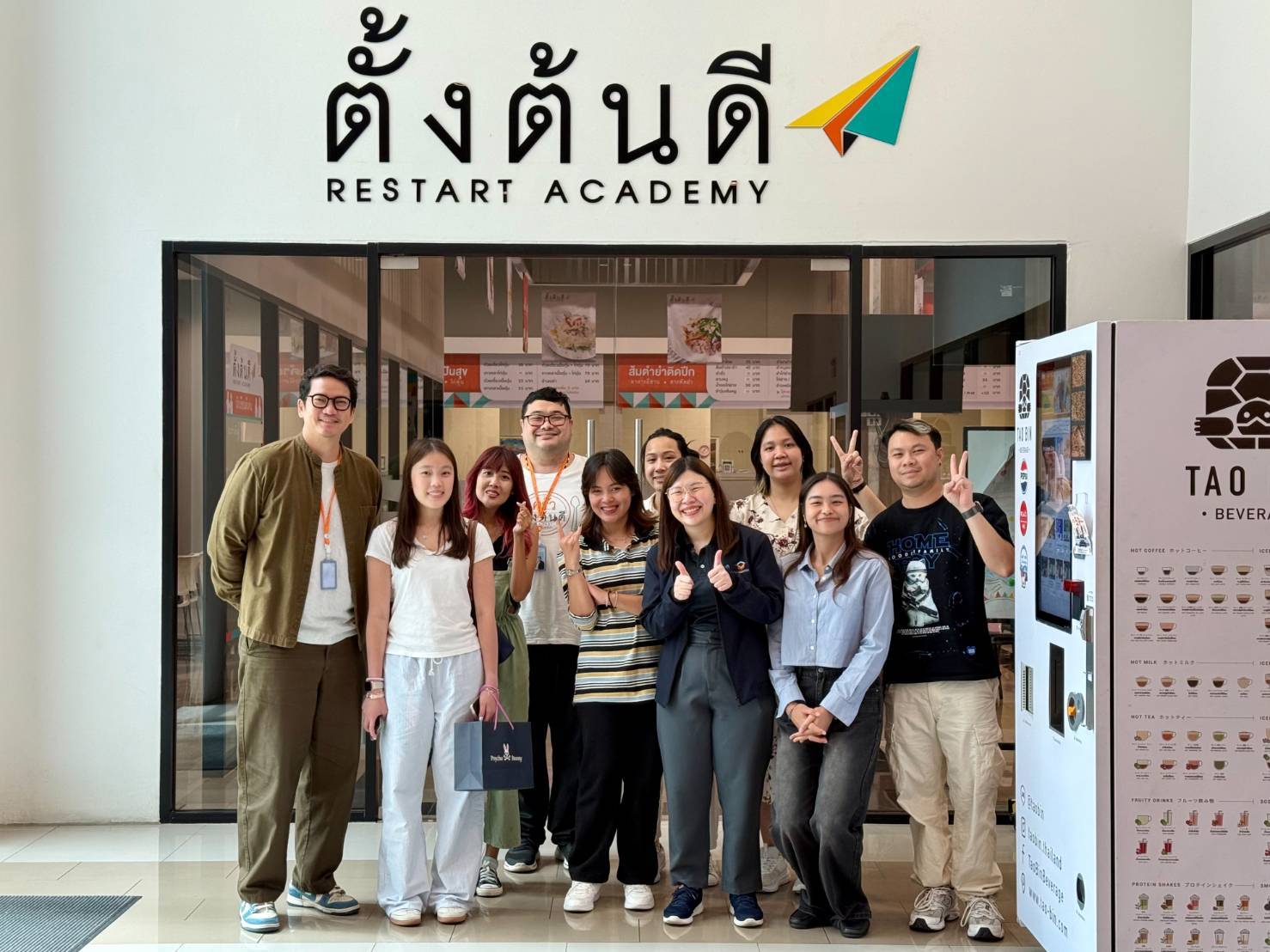 Before visiting TIJ, I had a general understanding of what the Restart Academy was: a vocational training program that TIJ supports previously incarcerated people as they re-enter society. I had read about its goals and structure, and I knew that the program offered participants real work experience in areas like food service, laundry, and health and beauty. But I still carried assumptions that people working there would be difficult to talk to, or that the jobs would feel artificial or disconnected from what employment looks like on the outside. It wasn’t until I spent time at the Restart Kitchen – observing the flow of the day, watching people work, and sitting down to listen – that I fully understand the human side of the program. What stood out most was that everyone wasn’t defined by their past, and they all focused on doing the job well, and helping each other along the way.
Before visiting TIJ, I had a general understanding of what the Restart Academy was: a vocational training program that TIJ supports previously incarcerated people as they re-enter society. I had read about its goals and structure, and I knew that the program offered participants real work experience in areas like food service, laundry, and health and beauty. But I still carried assumptions that people working there would be difficult to talk to, or that the jobs would feel artificial or disconnected from what employment looks like on the outside. It wasn’t until I spent time at the Restart Kitchen – observing the flow of the day, watching people work, and sitting down to listen – that I fully understand the human side of the program. What stood out most was that everyone wasn’t defined by their past, and they all focused on doing the job well, and helping each other along the way.
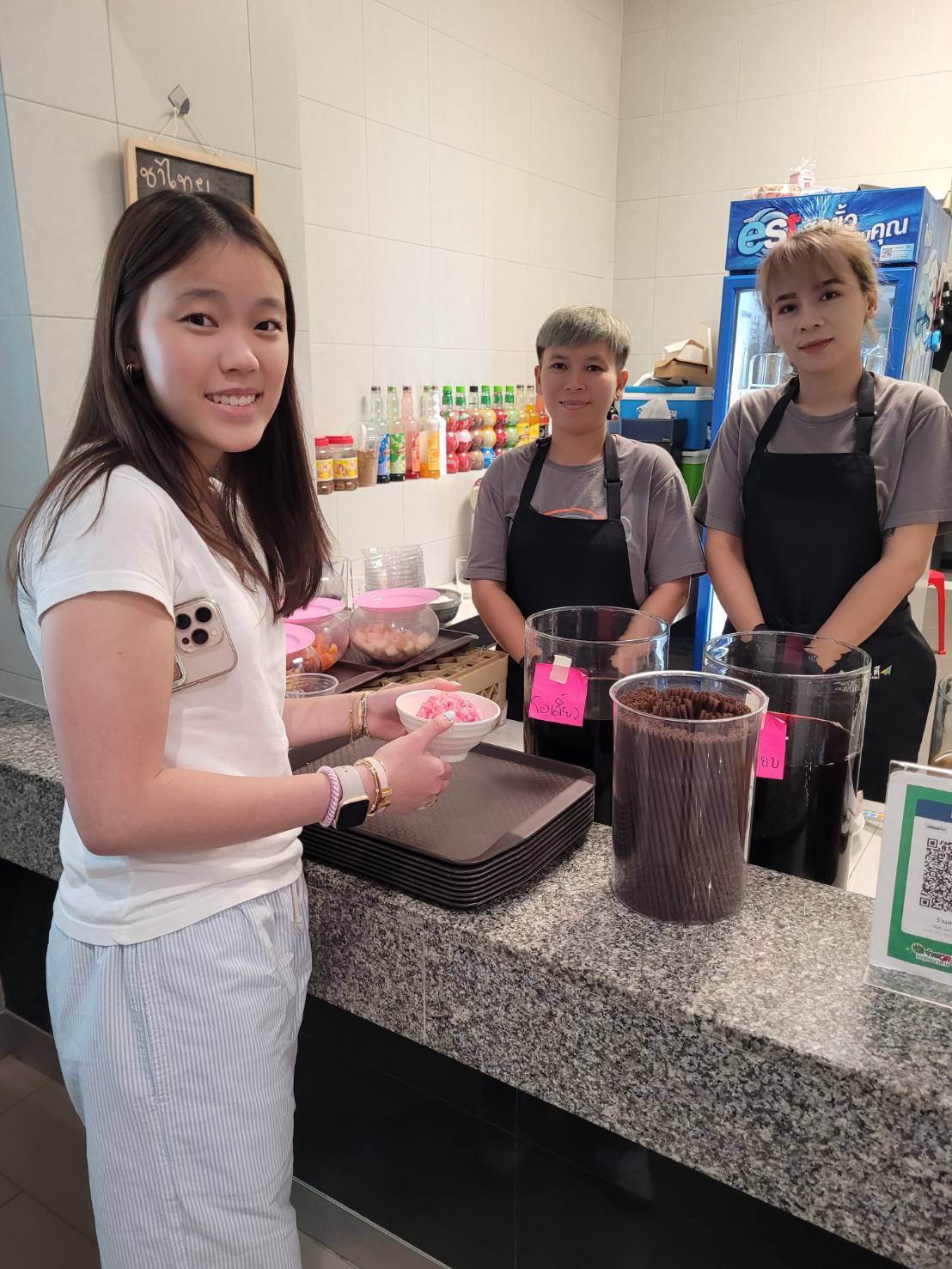
The Restart Academy uses a peer-supported model. Alongside hard skills like cooking, massage, and inventory management, trainees participate in classroom sessions on topics like debt management, emotional regulation, and mental resilience. They also learn soft skills such as learning how to stay calm under pressure, and resolve workplace conflict. Participants often support each other by offering practical help and encouragement. Some told me they’d never had this kind of space before, where they could talk through stress or ask for advice without judgment. The atmosphere is collaborative, not competitive. The space feels more like a community than a top-down workplace.
I interviewed two participants and one instructor, each of whom has been involved in the program for more than two years. They talk about what they enjoy, what they struggle with, and what they hope to do next.
Pranee Saetiew – 58 years old
 Pranee has been a member of the Restart Kitchen for two years. Her usual stations are moo tord (fried pork) and kai jeaw (Thai omelet), and in the mornings she prepares congee. She learns about the program through friends who already work there and decides to apply because she wants to work and needs the income.
Pranee has been a member of the Restart Kitchen for two years. Her usual stations are moo tord (fried pork) and kai jeaw (Thai omelet), and in the mornings she prepares congee. She learns about the program through friends who already work there and decides to apply because she wants to work and needs the income.
She enjoys meeting people and interacting with customers. She hopes to eventually work outside the program, possibly by the end of the year if she’s saved enough money, but isn’t sure what kind of job she would do since she doesn’t have other work experience. One of her main challenges at work is frying, which she finds intimidating because of the oil splashes.
Outside of work, her main concerns are financial. She still owes money to friends and budgets her monthly pay carefully. Each month, she says, she’s able to plan her spending more effectively. Her goals include taking her family out to eat and eventually being able to travel. She either walks or rides a motorcycle to work, which takes about an hour. She recently has a fall while biking in Khao Yai and will need knee replacement surgery, but hasn’t received treatment yet. She adds that she can still manage on her own.
Sopa (Maew) Kamjadrok – 56 years old
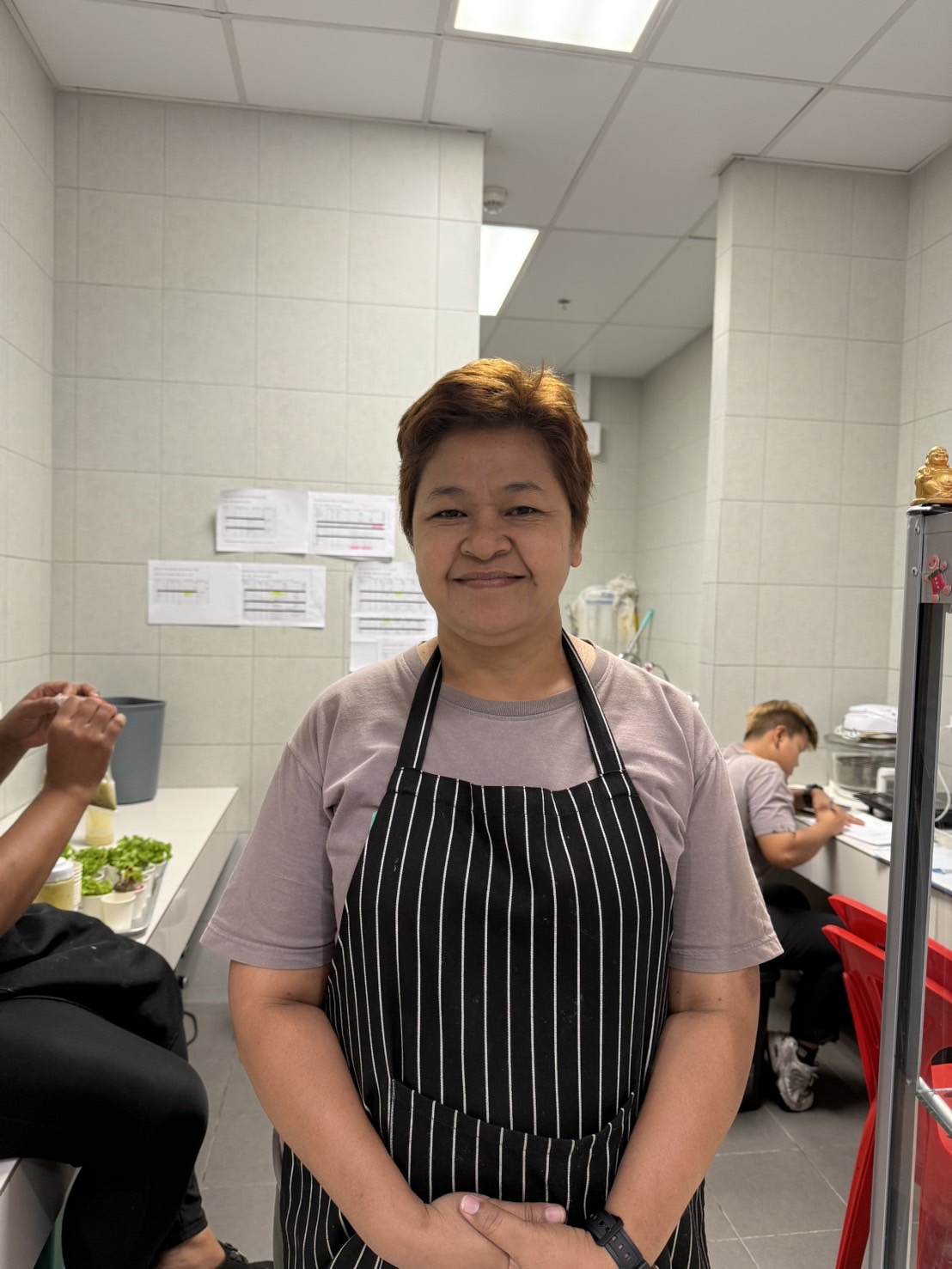
Maew, or as her coworkers call her, “Mae (mother) Maew,” has been with the Restart Kitchen for two years and four months. She has worked in every position in the kitchen and now serves as head of the team. She joins the program because she enjoys cooking, wants to improve her skills, and lives nearby.
Still, when people struggle, she and others step in. “We help each other get through it,” she says. As a senior figure in the kitchen, Maew is highly respected and often looked to for guidance, which is why many refer to her as “Mae” which translates to “mother” in Thai, a sign of trust and warmth, not just hierarchy.
She says she enjoys making friends at work and greeting customers. While she doesn’t dislike the job itself, she finds it difficult when coworkers don’t take responsibility. “The job is easy,” she says, “but people can make it harder.” From her time at Restart, she has learned how to cook more healthily (using less MSG) and how to grow her own food.
In her free time, she spends time with family, goes fishing, and takes walks in nature. She says she’s happy with her job and her team, and that they’ve overcome many challenges together. If she had 10 million baht, she would upgrade the kitchen with high-tech equipment and take care of her mother. In five years, she hopes to step back from her leadership role to give others a chance to grow.
Suphaaut (Puh) Oonlamai – 54 years old
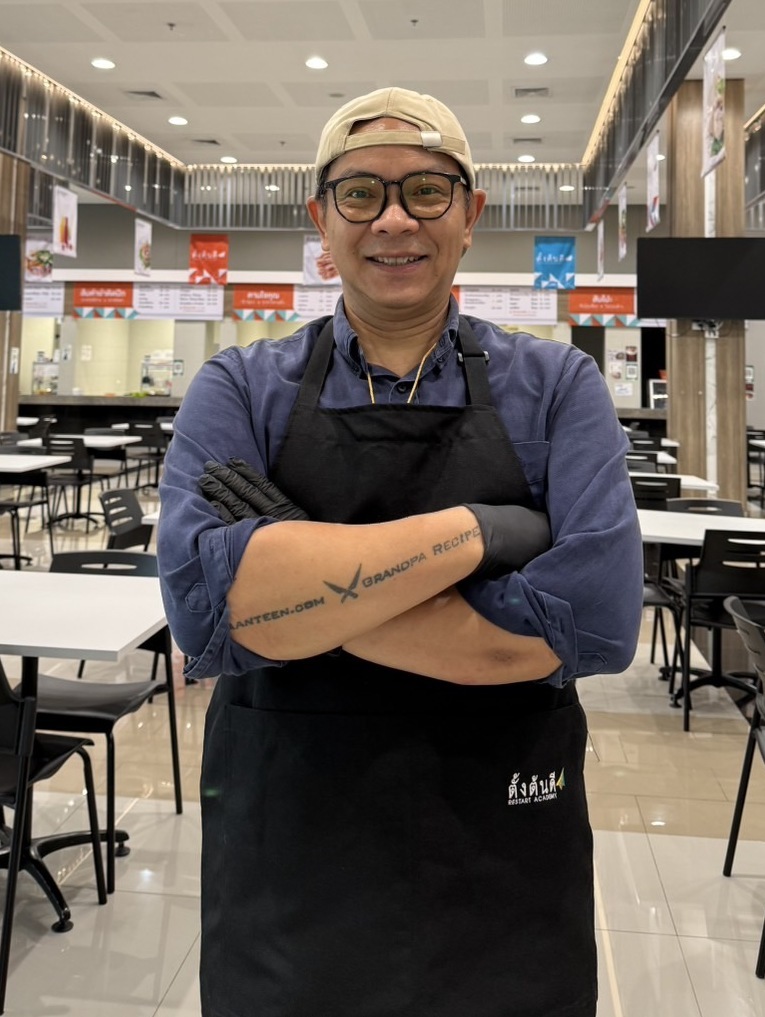 P’Puh has worked with the Restart Kitchen as instructor since it opened two years ago. He was personally invited by Thanachai Sundaravej, TIJ’s Senior Manager of Social Partnership and Public Engagement, to join the project because of his experience in kitchen operations and food consulting. Now, he teaches kitchen planning, service systems, and stock management. He says he chooses to work in this project because he believes in its values and its focus on social impact.
P’Puh has worked with the Restart Kitchen as instructor since it opened two years ago. He was personally invited by Thanachai Sundaravej, TIJ’s Senior Manager of Social Partnership and Public Engagement, to join the project because of his experience in kitchen operations and food consulting. Now, he teaches kitchen planning, service systems, and stock management. He says he chooses to work in this project because he believes in its values and its focus on social impact.
He describes his role as both teaching and learning, explaining that “you can’t use the same methods with everyone. You have to adjust, and that’s made me a better mentor.” He appreciates the flexibility of setting his own schedule at TIJ, which allows him to continue working as a food consultant elsewhere. He describes himself as someone who is “always selling”, not just food, but also systems and ideas
Spending time at the Restart Kitchen made me aware of the initial biases I didn’t realize I had. I expected Restart to feel something controlled, maybe a little impersonal. I thought the people working there might be guarded, or that the jobs would feel like placeholders rather than something meaningful. But what I found was a real workplace, with real dynamics, real frustrations, and real pride. People showed up early, helped one another, took initiative, and cared about the work. Listening to people like Maew and Pranee talk about their routines, their goals, and how they support each other made it clear that Restart is a space where dignity and community are being built every day.
I appreciated that the stories I heard weren’t overly dramatized, which made them stick with me even more. I saw people figuring things out one day at a time: learning how to budget, building confidence in the kitchen, managing frustration when things didn’t go smoothly. One woman talked about her fear of hot oil, but still showed up at the same station every day. One came in with sore knees, long commutes, or financial stress hanging over them, but kept working. These weren’t stories about overnight transformation, as you could see the consistency and patience being built over a duration of hard work and support from others. When you spend time at Restart, you don’t just see people doing a job, you see people taking themselves seriously again, sometimes for the first time in a long while, and what it means to be part of a team that notices when you’re trying, and makes space for you to keep trying.
About the Author
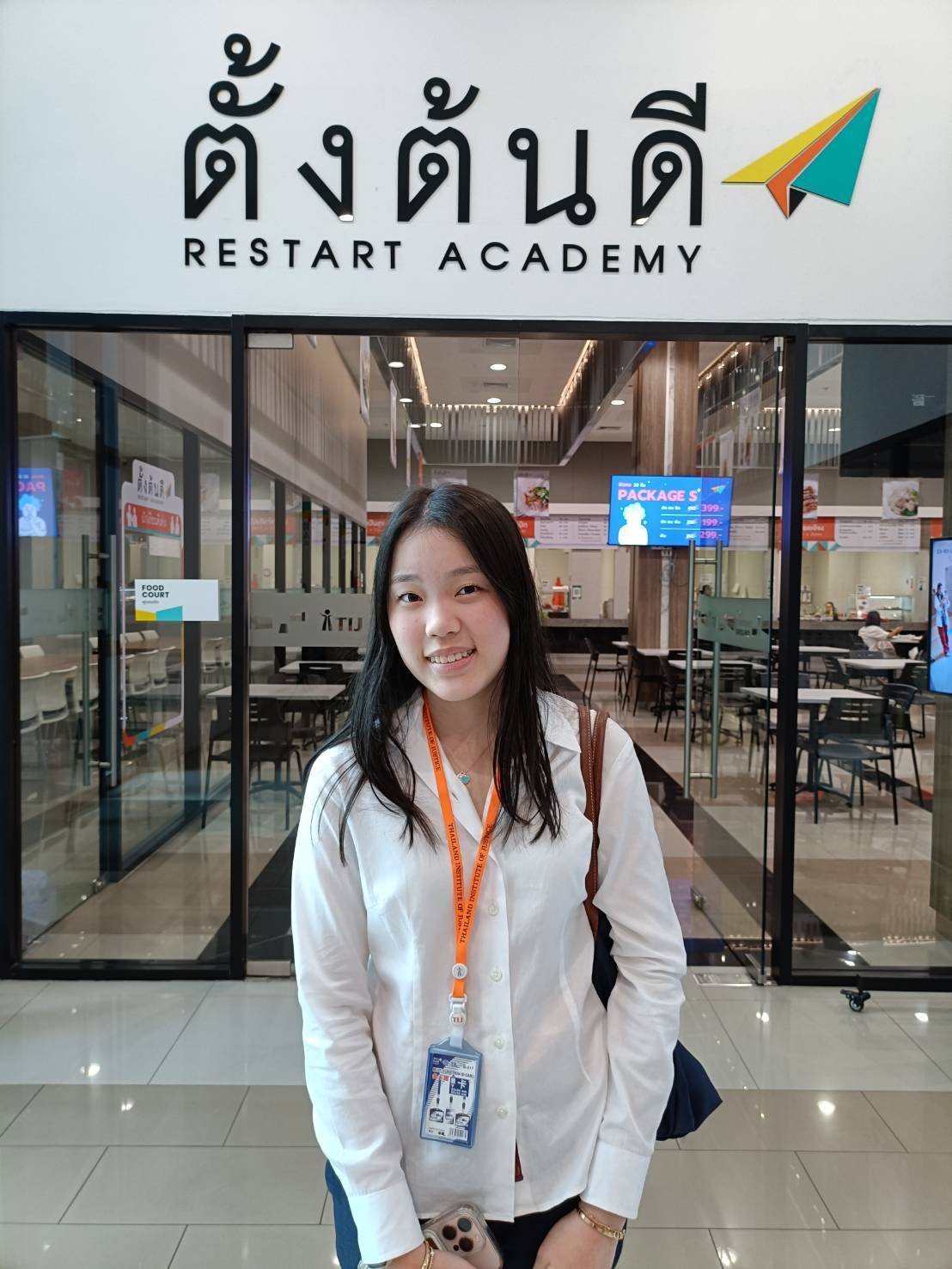 Claire Kietduriyakul is a high school student at the Loomis Chaffee School in Connecticut, USA. She is passionate about labor rights, social policy, and ethical supply chains, and spent a week at the Thailand Institute of Justice as part of a spring internship in March 2025.
Claire Kietduriyakul is a high school student at the Loomis Chaffee School in Connecticut, USA. She is passionate about labor rights, social policy, and ethical supply chains, and spent a week at the Thailand Institute of Justice as part of a spring internship in March 2025.




